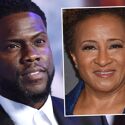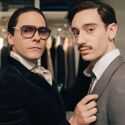
He recorded over two dozen Top 40 hits. He appeared on programs from What’s My Line to The Ed Sullivan Show. He’s name-dropped in the first line of “Come On, Eileen” AND “We Didn’t Start the Fire.” Yet, when folks list queer music stars, Johnnie Ray’s name is liable not to come up among the Bowies and Mercurys of memory at all.
That may be because, like many figures like him in the ’50s, Ray didn’t openly identity as queer. That said, it was specifically his unmasculine manner of performance that seemed to make him the figure that he was, even in the midst of Lavender Scare America.
He sang with a melancholy that was heavily inspired by the blues and jazz acts that preceded him, as well as presumably by a natural well of emotion all his own.
This feeling shown through in his debut 1951 single, a rendition of the Churchill Kohlman tune “Cry.” It shot to the top of the Billboard Hot 100 and stayed at number one for eleven weeks. Even its B-side, “The Little White Cloud That Cried,”made its way to number two.
How about we take this to the next level?
Our newsletter is like a refreshing cocktail (or mocktail) of LGBTQ+ entertainment and pop culture, served up with a side of eye-candy.
His emotion was not relegated solely to his song titles; Ray would often break down in tears during his performances in evocative, sometimes raucous displays that drove crowds wild. A writer for Billboard referred to a show of his as “a masterful display of showmanship that evoked mass hysteria resembling a Holy Roller meeting.”
A particularly tear-inducing track is his rendition of The Four J’s “(Here Am I) Broken Hearted.” The lyrics tell of the singer’s “old gal” and “old pal” getting together, with the singer losing both connections in the process. In contrast to the easy doo-wop of the original, Ray wails out the bridge of “it’s bad enough that I lost her/I had to lose him too” at a fever pitch.
Ray’s sexuality is well-documented in its own way, most concretely through a couple of publicly-known arrests he racked up trying to pick up male undercover cops in bars. Between those, his general disposition, and posthumous testimony from several friends in a biography, little doubt exists that he was a friend of Dorothy. It’s barely even euphemistic, as he was actually the Best Man in Judy Garland‘s last wedding.
Ray isn’t forgotten by any means; Bob Dylan has cited him as “the first singer whose voice and style I totally fell in love with,” and Tony Bennett has referred to him as the “father of Rock & Roll”. His legacy is cemented in the archives of queer music history — or Spotify, whichever you prefer.
Hear Ray bemoan his loss as only he can in “(Here Am I) Broken Hearted”:


















Donston
It’d be nice for people to stop giving identities to long dead people. We don’t know if this man ever embrace a “gay” or “bi” or “straight” identity in his public or private life or what identities he would have embraced today. Just say he had queer dimensions and keep it pushing. I don’t know why the media protects closeted entertainers and allows people to embrace whatever identities but are quick to give identities to long dead people.
barryaksarben
I think Johhnie would be fine being named as gay. since he was busted not once but a few times for picking up men in bars, Your outrage is so silly and pathetic at the same time, but should wait a decade before calling you that?
Donston
First, the article gives him a “bi” identity not “gay”. Second, you don’t know what someone would or wouldn’t be comfortable with if they were alive today. Hell, there are people today who spend years in same-sex relationships and still claim that they’re “straight” or don’t attach to a queer identity. And the media respects that. I’m just tired of the double standards. I have no problem talking about people in the past and their lifestyles and struggles and speculating about their dimensions and motivations. Giving them identities though is just not needed. If there’s anything I’m “outraged” about it’s the double standards and hypocrisies. Some of which you’ve indulged with your posts. So, I can understand why you get so pissy towards me.
Cam
He was arrested for trying to pick up male police for sex. You are acting as if naming somebody as gay, bi, pan, etc… is a horrible insult. It is a fact that without this, people are automatically assumed to be straight. That continues to push the closet, I have no problem with them pointing out that his activities land him on the gay.bi.queer side of things, and unless you find that to be something bad, I’m not sure why you would either.
monty clift
It’s interesting how this type of thinking only ever applies to sexuality or sexual orientation. You never hear someone say, maybe we shouldn’t label people “man” or “woman” you know just in case past dead people didn’t identify with those labels.
blf49
This is always such a difficult topic. You have no idea how he would react to “having queer dimensions,” either. And it’s hard to find another term that is both neutral and truthful.
He didn’t hit 1 on the Kinsey Scale, but even that doesn’t work. There must always be some fuzziness when you try to use today’s terms for yesterday’s people. Would many people from Gen X or later use “friend of Dorothy?”
James
GET LOST HOMOPHOBE.
Bosch
@Donston
This article demonstrates how difficult it was to be gay or bi in the 50s. Stop looking for reasons to get upset, and just have some sympathy for the men who came before us.
It’s obviously not Queerty who is trying to “protect closeted entertainers”.
dbmcvey
Judging by the photos, he enjoyed himself.
Joshooeerr
Not naming and claiming gay/bi figures from history is just another kind of erasure, and invariably comes from a deeply homophobic place. In Johnny Ray’s case “bi” is probably a stretch, even given his fling with Kilgallen and his illegitimate son. He was a gay man who coped as 90% of gay men did in his time – by covering with some pretence of heterosexuality. That doesn’t make you bi.
bachy
(Here I am) Brokenhearted. Well, I can certainly relate to that sentiment, my dear Johnnie Ray!
Derek Northcutt
Dorothy Kilgallen gave birth to Johnny Ray’s son, and after her death the boy lived as her husband Dick Kolmar’s son until that bastard threw him out of Dorothy’s Eastside townhouse when he still a schoolboy (she died in 1965.). But Johnny was gay as reported in Kilgallen’s biography — she bailed him out of a New York jail when he was charged, as many of us were in the 1950s, with “lewd behaviour.” At the time that could be anything from nursing a drink in a gay bar to sucking a cop’s dick in an entrapment sting.
Mack
“At the time that could be anything from nursing a drink in a gay bar to sucking a cop’s dick in an entrapment sting.” I remember those days. You really had to be careful of where you put your hands, not that the other guy complained, but if the cops saw you it was an arrest.
DK
I remember a very animated conversation in the 90s, between my grandparents on “Who killed Dorothy Killgallen?” Had no idea what it meant or who she was until a couple decades later, thanks to the magic of YouTube at resurrecting long forgotten clips from once-popular TV programs.
Rick Notch
Johnny Ray co-starred in the 1954 musical “There’s No Business Like Show Business” about a vaudeville family in the 1930s. In one scene he tells his parents, Dan Dailey and Ethel Merman, that’s he leaving the family act to become a priest. Their reaction is word-for-word as if he announced he was gay. Classic scene!
mikeTigg
I loved him in that film. I related to him so much even though had yet to come out at the time. I especially loved it when he sang “If You Believe”. Also I remember having a daddy crush on Dan Dailey
The real Bruce
Love that movie too Rick. That scene when he leaves to become a priest looks like such a soul searching scene. And in the 50’s careers could be and were ruined by the gossip “reporters”. Johnnie Ray was such a talent with such a unique voice fans just adored him no matter what. I have a CD of the greatest hits of Johnnie Ray and after seeing this article, I’m going to listen to it. Memories, oh yeah!
DK
Ah, I love that flick. Didn’t know that was him. Have to look it up, since all I can recall from it now is The Merm.
Den
The similarities between his phrasing and attack and Patsy Klein’s is uncanny. They certainly would have heard each other sing.
The real Bruce
They really are! Both of them also sang the lyrics from the heart and that’s everything when you really listen to the songs.
Huron132
This was so interesting. I love learning about artists, actually anyone that busted down that closet door. No matter what lable you give him. His music is wonderful and I look forward to hearing more of his music and his life.
Rock Star
cool singer.
humble charlie
There is a book called “Rocking the Closet: How Little Richard, Johnnie Ray, Liberace, and Johnny Mathis Queered Pop Music (New Perspectives on Gender in Music)” by Vincent L Stephens. It should be a must read for anyone interested in gay male singing stars of the 1950s. The only one who seems to have lasted (and still performing!) is Johnny Mathis (now in his 80s), an incredibly talented lyric tenor who has had as much influence on popular music as Johnnie Ray, another lyric tenor.
DK
Johnny Mathis still sounds great. Underrated artist who deserves to be celebrated much more.
bachy
An uncles record of Johnny Mathis singing “Misty” would give me erections when I was pre-pubescent. For reals!
ralphb
After reading this article, I just have to put in my two cents worth. I first saw Johnnie Ray in the movie No Business Like Show Business in the late 50’s. I think it came out in 58, so it must have been 58 or 59. His voice and moving style of delivering a song grabbed me, and I’ve been a fan ever since. I have vinyl records, tapes, and CD’s of him, and I have a couple of movies on video tape. Every time he sings “Believe” tears comes to my eyes. I’ll remember him the rest of my life as my favorite male singer.
Ryckard14
I credit him and Johnny Mathis with bringing me to understand that I was gay. I was very, very young and had no concept of what being gay actually meant, but I immediately identified with them. Later I came to realize why. I thank them both and when in an nostalgic mood often recreate those moments.
Jim
OMG the author is showing his age. Johnnie Ray was of a generation before Mercury and John.
Thanks for the article thought. gotta get some of his tunes on my phone. Gotta go
abfab
Leslie Gore. Neil Sedaka. Discuss.
Paul2
Let’s not forget There’s no Business Like Show Business, where he wanted to be a priest (aka gay)
Bromancer7
He had an affair with Dorothy Kilgallen, newspaper reporter and panelist on the 50s/60s version of the game show What’s My Line? So it sounds like he was at least bi.
dbmcvey
Thanks for this. He was a great talent and performer.
mildredspierce
I saw him in Judy Garland’s swan song documentary “The Last Performance”, It was during the final months of her life. As she would be dead 6 months later, the final bootleg edit was very telling….and sad.